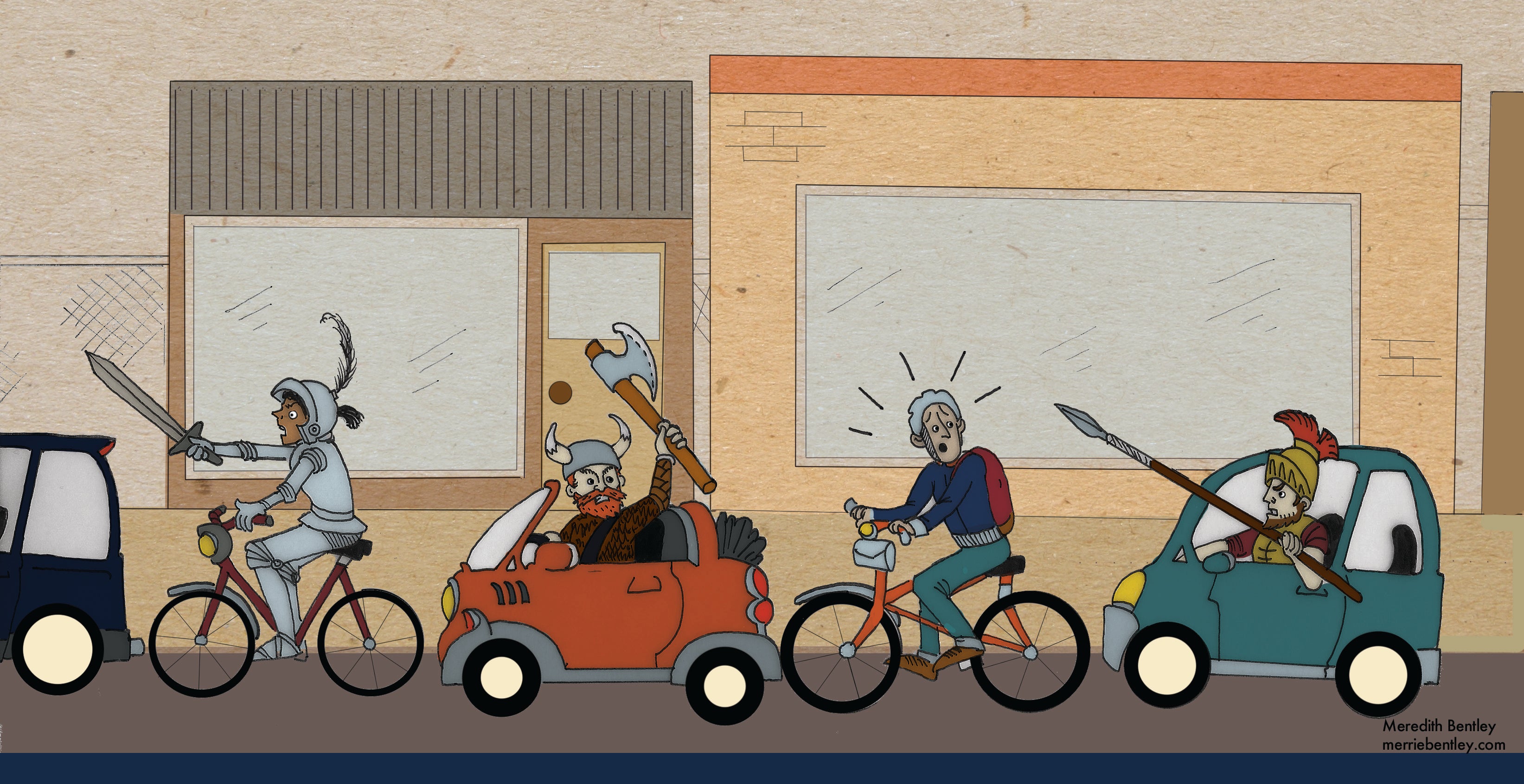Be the bigger vehicle

Community Contributor Nicholas Mirra calls for civility on our contested streets.
Be the Bigger Vehicle
By Nicholas Mirra
Philadelphia is engaged in an active conversation about bicycles, vehicles, and streets. It is constantly bubbling at a low level online and offline, occasionally geysering up when new legislation, infrastructure, or crashes appear. I participate in this conversation on a daily basis, both as a street user and as the Communications Coordinator for the Bicycle Coalition of Greater Philadelphia.
I don’t believe heated bicyclist-motorist relations are irredeemable.* And it is a truism that all parties could contribute more to an atmosphere of civility and safety in our streets. However, a pattern we at the Bicycle Coalition witness within the discussion compels our ongoing petition to fellow bicyclists: We need to follow the rules of the road. No, really, just do it.
To quickly define terms, I’m talking here specifically about the Three Big No-No’s of urban bicycling: riding on the sidewalk, running red lights, and riding against the flow of traffic. Those three behaviors have the largest negative impact upon bicycling’s nascent standing in our city.
Some bicyclists commit these transgressions because they don’t know they’re illegal. Some know but are only concerned with speed. Both groups are not excused. But others know the laws and instead offer elaborate rationalizations for their behavior. These are frequently variations upon the theme, “I’m actually being safer/smarter/helping traffic flow better.” It’s that smug ‘actually’ that galls, because buried therein is a root of bicyclists’ image problem: the perception that we think we know better. We reinforce it by reinterpreting laws to make our behavior appear safe or noble.
Well, sorry, that’s not how civilization works. And it contributes to a stressful street climate of vindictive, they-started-it behavior that gets people hurt.
Bicycling’s explosive growth has filled Philly streets with this new class of user, but we’re still negotiating the legal and de facto guidelines for how we expect bicyclists to behave. Unlike with motor vehicles, we don’t have decades of ubiquitous usage to formalize norms for bicycles’ operation. This means bicyclists’ cumulative behavior is informing this process, and willful disregard for the laws only galvanizes those who believe bicycles are undeserving of accommodation.
Think Philly should pass an “Idaho Stop” rule? Want a North-South bike lane through Northern Liberties? Get involved! Talk to your City Councilperson, volunteer, ask your local civic association for their support. Shaking your fist at a car parked in the bike lane, then grazing pedestrians as you blow a red light, undermines that fist. Who struck the first blow? It doesn’t matter. Our research has found that bike lanes improve bicyclists’ behavior. But a critical mass of bicyclists’ contemptuous or oblivious behavior can kill new projects. When a neighborhood complains to City Council about bicyclists endangering pedestrians (regardless of the true prevalence of those incidents), improvements like bike lanes and bike parking get harder to win.
(“Well, I’m careful and never hit pedestrians” is what everybody says until they hit one.)
Yes, there are drivers who intentionally intimidate or hit bicyclists. But they are exceptions, and we shouldn’t let them hijack the streets. The vast majority of drivers don’t want to hit bicyclists. Like an elephant in a butterfly garden, we’re nervous maneuvering around these fragile and seemingly-unpredictable souls. Over time, drivers and bicyclists will collectively grow more accustomed to one another. In the meantime, bicyclists have to “be the bigger vehicle” and not shirk responsibility by claiming victimhood or a more enlightened view of the laws.
Philly drivers, for their part, should learn the rules of the road (here and here), and remember that a car horn is not a good method of communication. A honk at a bicyclist can mean, “Careful, I’m here,” or, “Get on the sidewalk before I run you over.” To a bicyclist, both are jarring and sound the same. Philadelphians use horns as weapons, and they scare less-experienced cyclists off the road. Until that glorious day when car horns are made as loud inside the car as they are outside the car, use your horn with prudence.
Philadelphia’s growing enthusiasm for bicycling is exciting, and portends a healthier, more robust city. In this formative time, the Bicycle Coalition urges bicyclists to take the long view. The 30-second convenience of sidewalk riding is not worth the PR damage. The long-term solution to better Philly transportation involves urban planning, investment, police engagement, education and outreach, and all street users actively deciding to be courteous and to play by the rules. Bicyclists can do their part by remembering that we are representatives of our mode of transit every time we ride, and wait patiently at the light.
* I use “bicyclists” and “drivers” with reluctance because such labels create groups of Others and ignore our overlapping participation in those activities. Most bicyclists are at other times drivers and pedestrians. In the moment they are simply people riding bicycles, and wouldn’t necessarily list bicycling as fundamental to their identity any more than most people driving cars would identify as “drivers.”
Nicholas Mirra is the Communications Coordinator for the Bicycle Coalition of Greater Philadelphia, where he writes, tweets, and changes the water cooler jug. Outside of a bicycling context, Nicholas performs improv comedy in Philadelphia and has written for The Onion.
WHYY is your source for fact-based, in-depth journalism and information. As a nonprofit organization, we rely on financial support from readers like you. Please give today.





